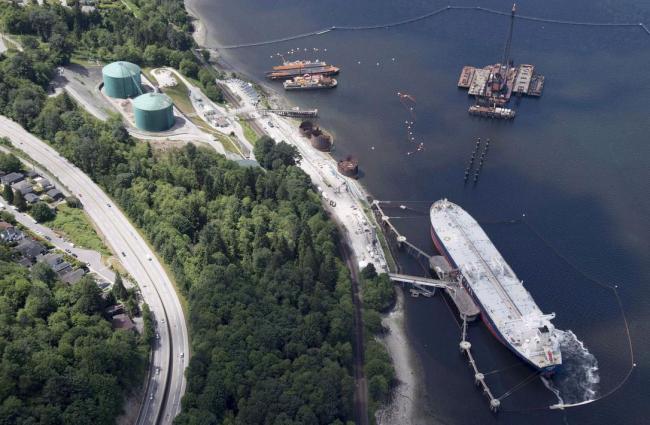Articles Menu

VANCOUVER—Indigenous leaders, environmentalists and federal members of Parliament say the National Energy Board is repeating the same flawed process that resulted in its approval of the Trans Mountain pipeline expansion being rejected by the Federal Court of Appeal.
Speaking in Vancouver on Tuesday, Grand Chief Stewart Phillip, president of the Union of B.C. Indian Chiefs, said the Trans Mountain project has been “a real stinker from the very beginning.”
The NEB’s second crack at the project review, ordered by the courts, has done nothing to change his perspective.
“We intend to continue this battle no matter what it takes,” he said. “This is about the future of our grandchildren.”
His message came the same day that Prime Minister Justin Trudeau announced plans to move forward with a carbon tax in the four provinces to opposed the measure next year.
While the federal government has repeatedly said it would meet its climate goals even with the pipeline expansion, Green Party Leader Elizabeth May said that’s like digging a hole and trying to escape it at the same time.
Eugene Kung, a staff lawyer with West Coast Environmental Law, said there may be a number of grounds on which to challenge the latest federal review of the controversial pipeline, including the short timelines for consultation and expert input and the limited geographic scope of the marine shipping impact assessment.
In August, three Federal Court of Appeal judges unanimously ruled that Ottawa’s attempts to consult First Nations during the review process of the Trans Mountain expansion were flawed and called ignoring oil tanker risks an “unjustified failure.”
The 1,100-km pipeline expansion is expected to triple the flow of diluted bitumen through the pipeline and increase oil tanker traffic to the Westridge Marine Terminal sevenfold.
The court quashed the project’s go-ahead until the NEB conducts further environmental assessment and a new consultation process.
Minutes after the ruling, an overwhelming 99 per cent of Kinder Morgan shareholders voted to finalize the sale of the $7.4-billion project to Canada.
In response, the federal government said it would re-initiate consultations with affected Indigenous communities and directed the NEB to reconsider its recommendation to approve the pipeline, this time taking into account the increase in marine shipping. The government gave the board 155 days to report back.
In a statement, a spokesperson for the board, James Stevenson, said the NEB is confident it can complete a “thorough review” of the marine shipping impacts within the timeline set out by the federal government.
Stevenson explained that the board has limited its assessment of marine shipping to 12 nautical miles: the territorial sea zone, as defined by the United Nations Convention on the Law of the Sea, where Canada has full sovereignty.
“Whether that is the minimum or not, I think the point is we have to stop aiming for the minimum,” said Kung.
He wants the board to expand the assessment to 200 nautical miles from the coast, the area included in Canada’s exclusive economic zone, where the government still has jurisdiction to protect the marine environment.
Alongside the review of marine shipping impacts, the federal government was ordered to redo consultations with affected Indigenous nations.
In a statement to StarMetro, Vanessa Adams, a spokesperson for Natural Resources Minister Amarjeet Sohi, said the minister has begun meeting and speaking with Indigenous leaders and will continue to engage with them.
“This project will benefit all Canadians, and we will take the time so that we can move forward in the right way,” she said, adding that “no relationship is more important to our government than the one with Indigenous Peoples.”
Squamish Nation councillor Khelsilem, however, said that by putting time limits on the consultation redo the government is not upholding its promise for reconciliation.
“We want a fair process,” he said.
But there’s a major problem going forward: both the government and those opposed to the project are entrenched in their positions.
While the federal government has reiterated its intention to see the pipeline expansion built, Grand Chief Phillip told reporters Monday that, in short, there is no process that could convince him to support the pipeline.
Environmental lawyer Kung added that the project would be rejected if a “wholesome process” was undertaken that considered both the up- and downstream impacts, the recent warnings from the UN’s Intergovernmental Panel on Climate Change and respected Indigenous rights.
[Top photo: Indigenous leaders, environmentalists and federal members of Parliament say the National Energy Board is repeating the same flawed consultation process the courts already rejected. Jonathan Hayward/The Canadian Press]